Unchecked nuclear fission encroaching upon Germany's borders - the unfolding peril posed by its neighboring states
In Europe, the future of nuclear power remains a contentious issue. Germany's energy and climate protection minister, Robert Habeck, has highlighted the economic unviability of constructing new nuclear plants, a view shared by some EU countries. However, others are pushing for nuclear energy as a key component in their energy mix.
France, a country with 56 nuclear reactors distributed on 18 sites, has the highest proportion of nuclear-generated power in the world, with 63% of its electricity system relying on nuclear energy in 2022. France's president, Emmanuel Macron, envisions nuclear power as a pillar of the French energy system for decades to come. Despite this, up to 32 reactors in France were shut down in 2022 due to corrosion and cracks, and the average age of the country's nuclear reactors is 38.6 years as of January 2024. The French government, however, plans to extend the operating life of its reactors in ten-year stages.
Belgium, originally planning a nuclear exit by 2025, has now extended the operation of two of its five remaining reactors until 2035. The Czech Republic, with six nuclear reactors, plans to construct more, and the European Union collectively aims to invest over 240 billion euros by 2050 in expanding nuclear energy, including new large plants and small reactors.
An alliance of 11 pro-nuclear EU countries, led by France, has formed to include nuclear in the new green industry support plan. However, Germany, Austria, and Italy oppose this inclusion. Countries like Hungary and Slovakia, while not directly bordering Germany, have nuclear power and are looking to expand their current programs.
Poland does not currently have nuclear power but aims to become a nuclear power, and Switzerland is considering lifting its 2017 ban on new nuclear plants to keep future energy options open. The USA is building new large and small modular reactors, such as the Fermi project in Texas. The Netherlands has one nuclear reactor and no plans to shut it down.
Notably, only one new reactor has come online in the EU since the late 1990s, specifically in Finland. Nuclear projects in Europe and North America during the last 20 years have often faced significant delays and cost overruns, making them economically challenging.
The Fessenheim nuclear plant in France was shut down in 2020. Agnès Pannier-Runacher, France's energy transition minister, explained that the government intends to allow the reactors to operate beyond their fortieth birthday.
As the debate over nuclear energy in Europe continues, it is clear that the future of this power source remains uncertain, with some countries pushing for expansion and others advocating for a nuclear-free future.
Read also:
- Understanding Hemorrhagic Gastroenteritis: Key Facts
- Stopping Osteoporosis Treatment: Timeline Considerations
- Tobacco industry's suggested changes on a legislative modification are disregarded by health journalists
- Expanded Community Health Involvement by CK Birla Hospitals, Jaipur, Maintained Through Consistent Outreach Programs Across Rajasthan








